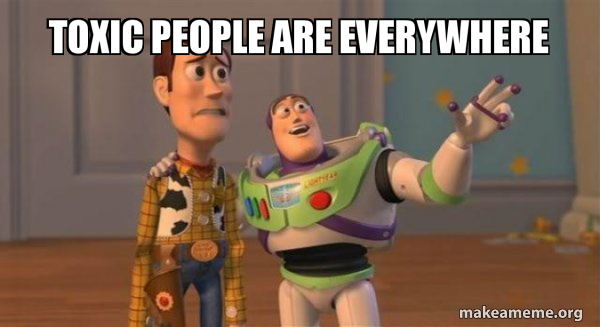Growing concerns have mounted over recent years as our life styles’ and technology have allowed us to live in ever more protected echo chambers. Many of us are familiar of this concept, getting our news, conversations, information, and interactions with people who think like we do, all the while distancing ourselves from those who live and see the world differently from us. The consequences of this can be seen at least in part through divisiveness, an inability to have constructive and meaningful disagreements with others, and a developed intolerance for those who don’t think like us. Our current social situation is far too complex to be reduced to a single factor, but we do see how echo chamber life styles can augment these social problems. While thinking about this, I was recently considering another popular concept that is being discussed in our current cultural climate, that of “toxic people”. Being made aware of toxic people, learning how to deal with them and avoid them when possible is becoming increasing prominent in our culture.
While I acknowledge that there are people in our society, whether they are internet trolls, crotchety angry neighbors, or even spiteful family, that can be harmful for us to engage with, I want to suggest a potential connection between echo chambers and avoiding “toxic people”. I have read countless articles about how to avoid toxic people, how to have a “good vibes only” mentality, and to only interact with people who build you up. While that sounds great, I believe that can unintentionally lead us towards a certain kind of echo chamber. While a former professor of mine used to say, “you can’t soar with eagles if you’re flapping around with turkeys” and there is truth to that, I think constructing your life in such a way that you never interact with anyone other than “good vibes” people reduces your ability to empathize and understand those who struggle in this life. In a sense, it creates a false social context, and can make it hard to see life from another point of view. The converse can be true as well, while misery loves company, it is easy for those who are depressed or jaded to avoid “happy people”, people who wake up ready to tackle the day or are excited about life.
Which either end of the spectrum you may tends towards, “good vibes only”, or “no happy people allowed” that mode truncates what real community consists in. Real community can be hard; it tests your patience, and rarely conforms to your likes or wants. Real community is complex and complicated, it is nuanced, and requires extending more grace than most of us would like to, it often requires more forgiveness too, and real community isn’t about you. Real community however is what helps us grow and teaches us how to live in harmony with our neighbors so in the end, real community may not be about you but it is for you.
Echo chambers start and stay because we think it is just about me not we. Echo chambers reinforce arrogance because life is easy and I’m pretty great when I’m only talking with people like me, but living engaging in real community with neighbors, friends, co-workers, and family who disagree with me often causes me to be humbled. Living in communities where we don’t all see eye-to-eye takes practice, work, and skill development, and helps us become who we are called to be, while the more we avoid it the more those emotional skills atrophy. Avoiding toxic people with their constant negativity may be needed at times, the world is a big place, and we certainly can’t expect to get along with everyone. By the same token, relying on our current technologies and social structure to only interact with those who think, pray, and vote like us, doesn’t fulfill the purpose of true community either, because the kind of community that is good for us challenges and forces us to grow in areas that we won’t as long as we stay stuck in our individualized echo chambers whether that is in politics or the “good vibes only” camp.
